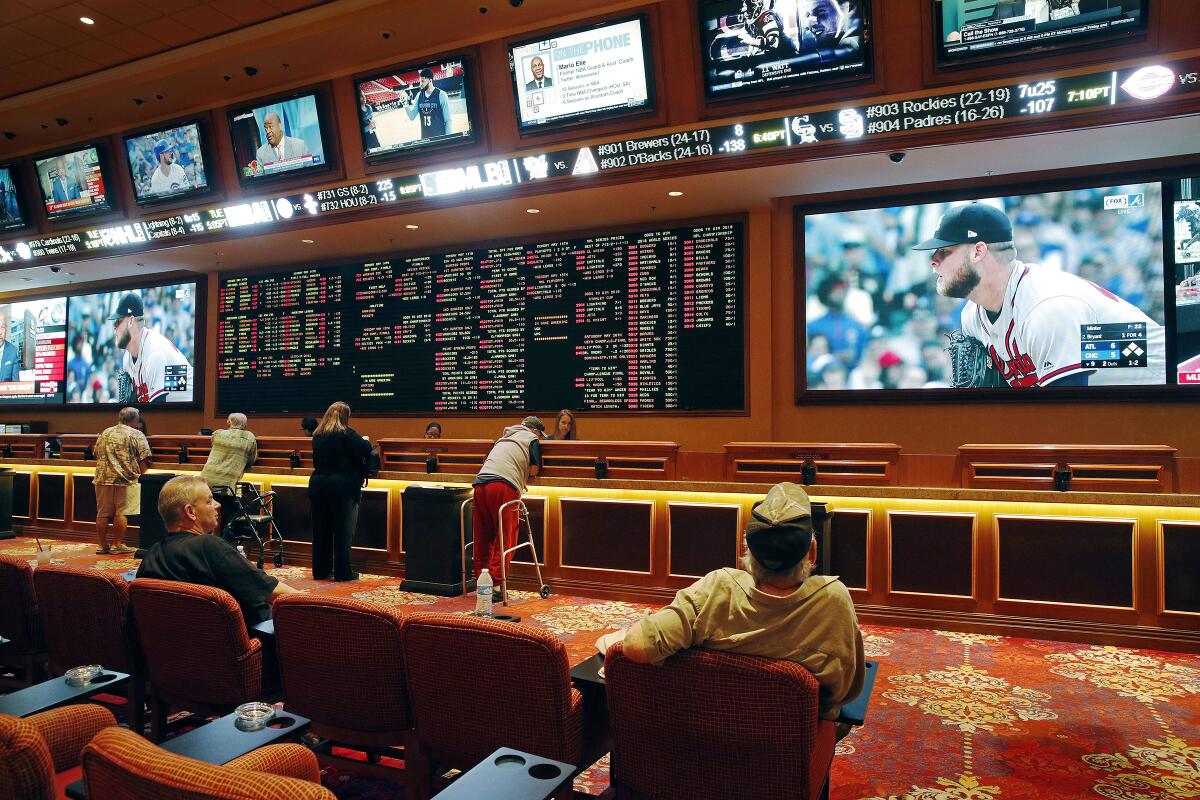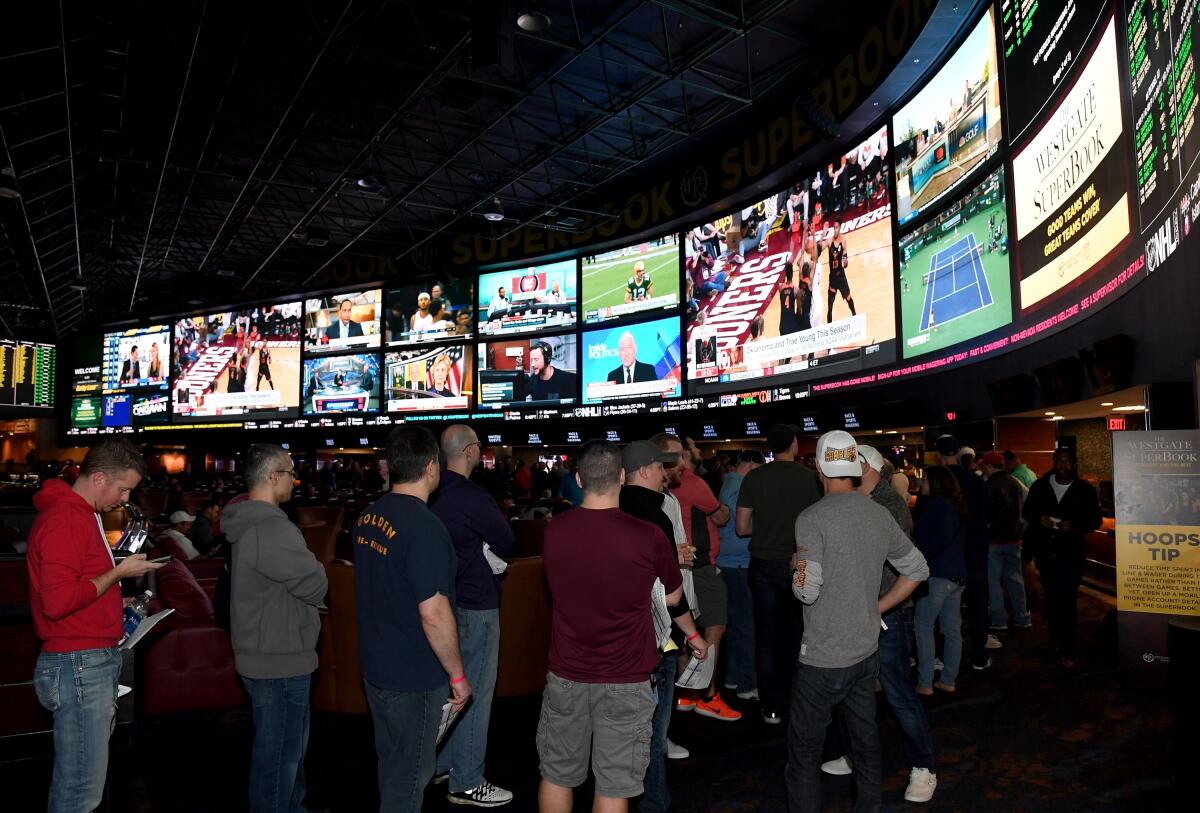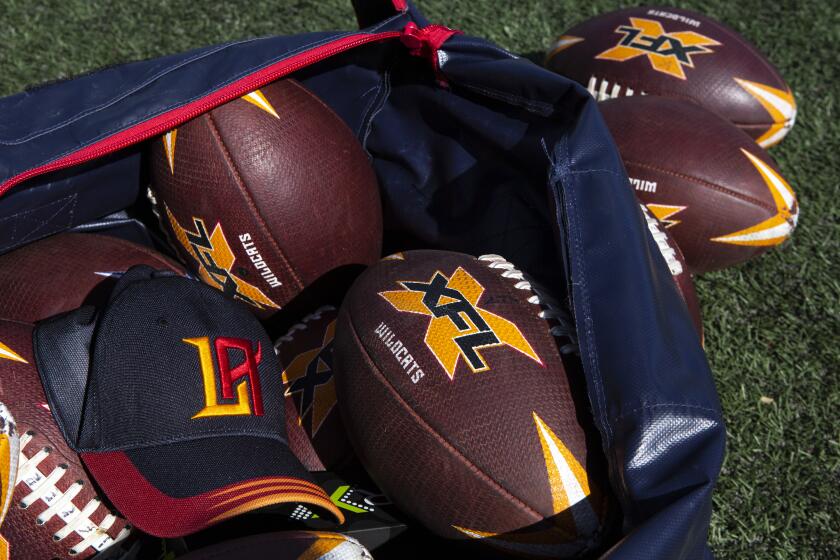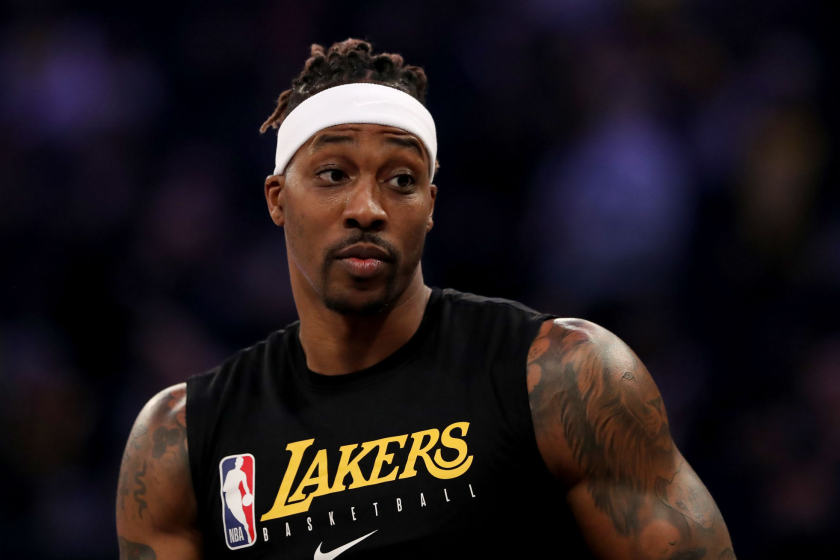Competition has begun to capture market for legalized sports gambling in California

- Share via
Legalized sports gambling in California is still at least two years away. But to those in the gambling community, the Golden State already looks like a potential golden goose.
Such is the power of California’s potential betting market, which PlayCA.com, a site that analyzes legalized gambling in the state, estimated could annually generate more than $30 billion in wagers.
The day the state legalizes the business, considered a virtual inevitability by most in the industry, will be like the start of a modern-day gold rush. Big-brand sports books and small-time oddsmakers alike will pour in, mining for millions of untapped customers.
“The numbers that we’re seeing, what we’ve heard anecdotally from the off-shore [gambling] operators … it’s going to be huge,” said Brian Musburger, founder and chairman of sports betting information site VSiN. “Everybody [in the gambling community] has their California plan in place. They’re just holding their breath.”
Some businesses have already put plans in motion, with Monkey Knife Fight, a fast-growing daily fantasy sports site, making among the most visible early efforts. Launched by entrepreneur Bill Asher in 2018, the site has already infiltrated the state through public partnerships with the Chargers, San Diego Padres and, as finalized this week, the AEG-owned Galaxy and Kings (which notably includes an on-ice logo at Staples Center starting next season).
“They want exposure, they want fan engagement,” said Josh Veilleux, the AEG senior vice president of global partnerships who helped negotiate the deal both parties believe will be popular among Kings and Galaxy fans. “To me, a team-centric deal makes a lot of sense.”
The XFL, which lasted only five weeks, might be best remembered for the way it embraced sports gambling.
Asher’s playbook seems simple: Promote his site’s already-legal daily fantasy sports products (deemed contests of skill that allow users from most states, including California, to play for money) while building brand recognition that could prove vital in a gambling-centric future.
“Let’s say California becomes legal,” Asher said. “If you’ve got 1 million people playing on your fantasy sports site, well, all of a sudden you’re going to get a license and offer them a gambling sports site.”
It’s not a novel business plan. In New Jersey, Pennsylvania and other states that quickly legalized sports betting after a 2018 Supreme Court decision struck down a federal law banning the activity, long-established daily fantasy sports sites DraftKings and FanDuel found instant success as sports books too, becoming the go-to oddsmakers for the thousands of users already on their sites.
“There was a general consensus they were going to be pretty competitive in the sports betting marketplace, given … the brand and the technology and the user base,” said Peter Schoenke, a board member for the Fantasy Sports and Gaming Assn. and president of the fantasy sports information site RotoWire. “But they certainly exceeded expectations in terms of their market share and how rapidly they grew.”
Doing the same in California would be like hitting the ultimate jackpot. In many states, business can swing drastically depending on the season and success of local teams, but California has “a unique blend” of bettors passionate about the NFL, college football and the NBA, Musburger said.

There are political uncertainties specific to California, where lawmakers declined to put a legalized gambling question on the 2020 ballot. For sports betting to flourish as the gambling companies hope, the state will need to adopt online and mobile options that would allow users to sign up from home.
“If you’re FanDuel or DraftKings looking at California, you really hope they allow a free market,” said Eamonn Toland, a sports gambling consultant who formerly worked for FanDuel owner Paddy Power. “Digital marketing being what it is, you’re trying to find people in their den [at home]. You’re not trying to find people as they make a journey to a card room or racetrack or tribal casino.”
Companies that are already enacting California strategies, Toland said, “are essentially placing a bet on how the markets are going to open up before you know for certain.”
Still, many in the industry are optimistic that California’s regulations won’t be too restrictive; that when the market eventually opens up, it will be ripe for competition.
“If you think back to the days of DraftKings and FanDuel ad wars,” Musburger said, referring to a multiyear stretch in the mid-2010s when the two sites reportedly spent hundreds of millions to attract customers, “it will look like child’s play when California lights up.”
That’s what has led a company such as Monkey Knife Fight — which Schoenke described as “a new force in the community” yet still owns just a minuscule slice of the daily fantasy sports pie — to differentiate its approach.
Instead of traditional team-building fantasy sports games, Asher’s site offers player-specific proposition games, such as a “More or Less” mode in which users try to predict a player’s performance in a certain statistical category (i.e., Will LeBron James score more or less than 28.5 points in a game?).
Lakers center Dwight Howard says he was warned about not wearing a mask after a tip to the NBA’s snitch hotline. Many players are pushing back on it.
Instead of running expensive ad campaigns in already established gambling states with little market share to spare, it is leaning on grass-roots team partnerships to make connections with consumers in seemingly soon-to-be-legal locales, such as Texas, Florida and Wisconsin.
Even the Monkey Knife Fight name, which Asher brainstormed with his business partners over a bottle of tequila, is meant to stand out.
“There’s going to be a tremendous value to whatever fantasy sports site is out there, is entrenched, and has brand awareness, brand loyalty and customers,” said Asher, whose site reported 400% year-over-year revenue growth before the COVID-19 pandemic. “We’re going to be able to, in California, suck up as many players as possible over the next couple of years while the gambling legislation goes through the process.”
They won’t be alone. While neither DraftKings nor FanDuel has any active sports team partnerships in the state, representatives of both companies indicated marketing efforts are already in the works. More traditional gaming companies such as MGM and European bookmakers will be expected competitors too.
“It’s an incredibly competitive space right now,” Musburger said. “The lifetime value of these customers is seen as in the thousands of dollars. Companies are willing to spend aggressively to build that relationship. … Every company wants to talk about the California strategy. It’s a massive opportunity and everyone wants a piece.”
Editor’s note: The Los Angeles Times has published news and advice columns from VSiN reporters based in Las Vegas.
More to Read
Go beyond the scoreboard
Get the latest on L.A.'s teams in the daily Sports Report newsletter.
You may occasionally receive promotional content from the Los Angeles Times.













